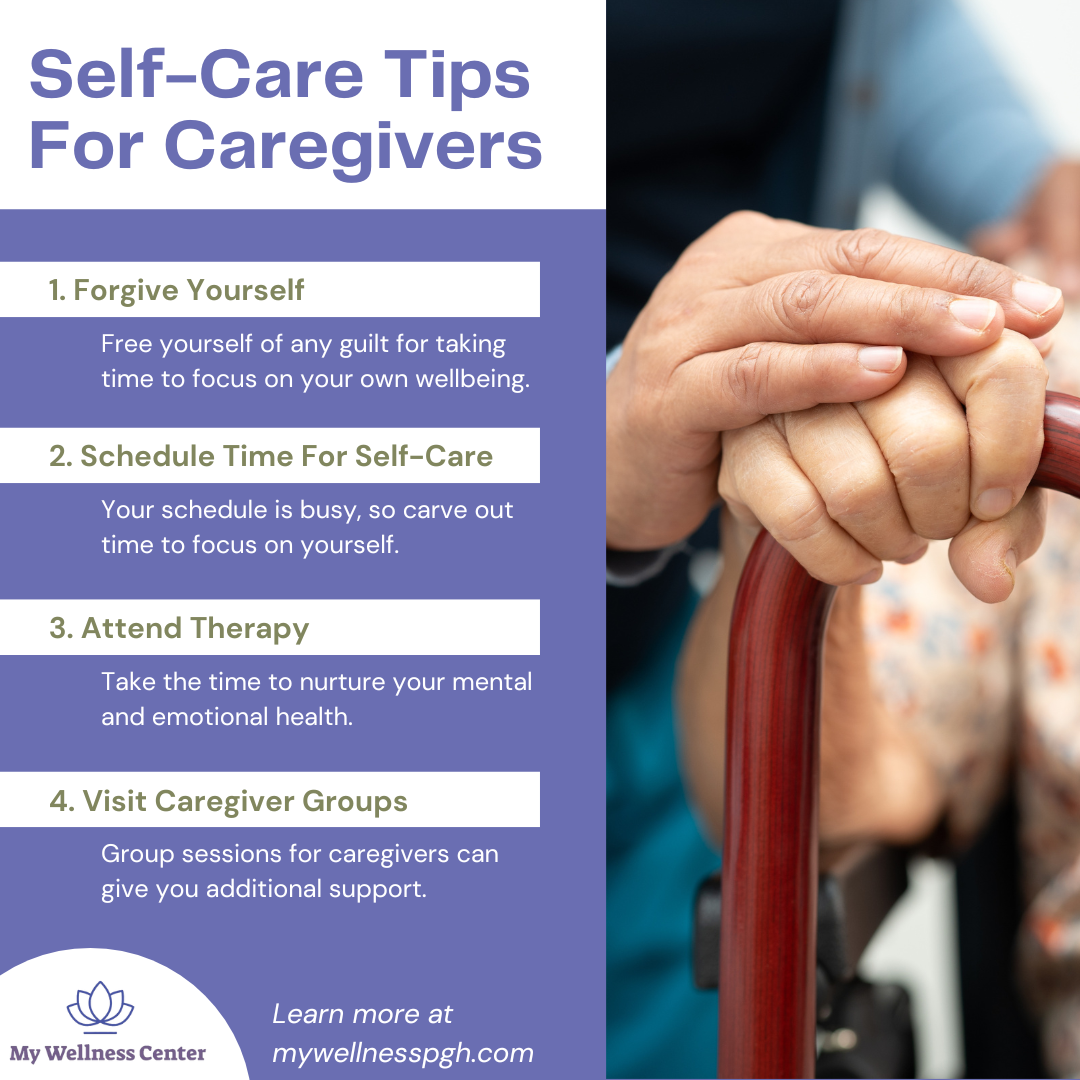It sounds like a paradox, but caregivers rarely practice self-care. While they spend much of the day worrying about loved ones, they often lack the time or energy to care for themselves, which can lead to burnout, depression, and even substance abuse. That’s why self-care for caregivers is so important.
As we explored in our therapy for caregivers blog, a shocking 60% of caregivers show clinical signs of depression, such as:
- Irritability or frustration
- Sadness, hopelessness, or worthlessness
- Difficulty concentrating
- Fatigue
- Difficulty sleeping
- Feelings of guilt or helplessness
- Anxiety
Caregiving is challenging. And burning yourself out as a caregiver will only make caring for your loved one even more difficult. We’re here to help. Read on to discover proven strategies that boost self-care for caregivers.
Table of Contents
Challenges of Being A Caregiver
Self-Care for Caregivers: 4 Tips
The Power of Caregiver Group Sessions
Therapy for Caregivers
Challenges of Being A Caregiver
The list of challenges caregivers face on a daily basis is long and complex, but here’s a brief summary of some of the issues that may gradually sap your strength:
1. Fighting
While you may adopt your caregiving role as a labor of love, it may pull you into complicated legal battles with attorneys and heartwrenching arguments with family members, especially if there are already unresolved issues within the family.
2. Endless Decisions
Being a caregiver often feels like managing wave after wave of decisions:
- Should my loved one go into a home?
- Does my loved one need to see the doctor again?
- What should I make them for their next meal?
- When should I go home?
If you’re trying to advocate for someone or act as a power of attorney, you have even more responsibilities—and a seemingly endless list of decisions to make on their behalf.
3. Substance Abuse
Caregiving is an exhausting responsibility, and some turn to alcohol or drugs to numb unwanted feelings.
Of course, this can lead to a vicious cycle: As these substances take hold, they impair an individual’s ability to provide care, which can lead to feelings of guilt—which can then lead to even more substance abuse.
4. Expenses
Many caregivers spend time away from work, which means a loss of income—which could mean less food at home or even risking the home altogether.
If you make the tough decision to place your loved one in a medical facility, you may face additional financial strain. Some of these homes cost thousands and thousands of dollars every month, which can quickly drain a family’s savings.
Plus, many of these facilities are poorly reviewed or understaffed, which can lead to additional concerns when you’re not there to provide direct care.
5. Making Time for Self Care
With so much going, it can feel impossible to pause for a healthy meal, take a walk through the park, or even take a shower.
When you’re a caregiver, you often rush home after a day of responsibilities to another round of responsibilities:
- Feed the kids.
- Clean the kitchen.
- Pay the bills.
- Let the dog out.
- Put the kids to bed.
- Prepare to do it all again tomorrow.
It’s an exhausting cycle, and pausing to read a page from your favorite book or catch an episode of your favorite show feels like an impossible luxury.
6. Emotions
Caring for a loved one can be an emotional rollercoaster. You may feel deep love and fulfillment in one moment, only to be overwhelmed with frustration, sadness, or resentment in the next. These emotions are natural, but without an outlet, they can become toxic.
Some of the most common emotions caregivers struggle with include:
- Guilt: Feeling like you’re not doing enough or regretting past decisions related to your loved one’s care.
- Anger: Frustration with the demands of caregiving, lack of support from family members, or even toward the person receiving care.
- Grief: Whether your loved one has already passed or is slowly declining, caregivers often experience anticipatory grief, mourning the loss of the person they once were.
- Resentment: Feeling unappreciated or burdened by responsibilities, especially if other family members aren’t stepping in to help.
- Loneliness: Caregiving can be isolating, making it difficult to maintain friendships, social outings, or hobbies that once brought joy.
Suppressing these emotions won’t make them disappear. Instead, it’s important to acknowledge and process them in a healthy way. Journaling, speaking with a trusted friend, or seeking professional help can be essential steps in managing these complex feelings. Remember, your emotions are valid, and taking care of yourself emotionally is just as important as taking care of your loved one.

Self-Care For Caregivers: 4 Tips
If you’re ready to dive into meaningful self-care for caregivers, try some of these tried-and-true techniques:
1. Forgive Yourself
Many of the caregivers we talk to feel guilty whenever they take time to themselves. After spending so many days in the service of someone else, your mind and body feels programmed to care for your loved one, and any time away feels like you’re letting them and the rest of your family down.
Understand this: You can’t show up for your loved ones if you don’t show up for yourself. As you burn yourself out, the quality of care you can provide diminishes—and so does your decision-making, your ability to fight legal battles, and your will to fight off temptations for unhealthy coping mechanisms.
Give yourself some grace and allow yourself to take time for yourself.
2. Schedule Time For Self-Care
A caregiver’s daily calendar is packed with competing responsibilities for work, family, caregiving, and chores around the house. Sometimes, taking even 15 minutes to slip into a hot bath seems like an unattainable luxury.
Take another look at the upcoming weeks and carve out time for your favorite activity. Maybe you want to sit in the park and read, or maybe you want to catch up with an old friend at a nearby coffee shop.
If necessary, ask another family member or trusted family friend to cover for you as you take time to re-energize yourself.
And, as a reminder, you should schedule time for self-care on a regular basis. If you can’t take a few minutes to yourself every day, block off that time every week and protect that time.
You’re worth it.
3. Attend Therapy
While we often think of self-care in physical terms—getting a massage, hitting the gym, or treating yourself to a nice dinner—your overall well-being stems from a healthy mind. Therapy is a vital component of self-care for caregivers, offering a safe space to process emotions, navigate difficult decisions, and learn coping strategies.
Many caregivers hesitate to seek therapy, believing they should be strong for their loved one or that they don’t have the time. However, therapy can be an essential tool for managing stress and avoiding burnout. Here’s why it matters:
- Processing Difficult Emotions: Therapy provides a structured space to work through feelings of grief, guilt, anger, and anxiety.
- Setting Boundaries: Many caregivers struggle to say “no” or ask for help. A therapist can help you establish healthy boundaries to protect your well-being.
- Improving Coping Skills: Whether it’s through mindfulness techniques, stress management strategies, or cognitive behavioral therapy (CBT), therapy can equip you with the tools to navigate caregiving challenges more effectively.
- Preventing Burnout: By addressing stress and emotional fatigue before they become overwhelming, therapy can help you continue providing care without sacrificing your own mental and emotional health.
If you’re feeling overwhelmed, consider seeking professional help. Many therapists specialize in caregiver support, and some offer virtual sessions to accommodate busy schedules. Investing in your mental health isn’t selfish—it’s a necessary step to being the best caregiver you can be.
4. Visit Caregiver Group Sessions
As we’ll explore momentarily, caregiver group sessions are a powerful strategy to combat feelings of isolation, tap into new resources, and connect with a larger community invested in supporting you on your journey.
The Power of Caregiver Group Sessions
Group therapy sessions can be transformational for caregivers, especially caregivers who feel overworked, undervalued, or who are struggling to show up for themselves and others.
Here are a few reasons group therapy or connections can be such important self-care for caregivers:
1. Realizing you’re not alone. As a caregiver, you may feel overwhelmed and all alone, even when you’re spending time with the individual you’re caring for.
Group sessions are an excellent way to tap into a larger community of individuals who are in similar situations and experiencing similar feelings of isolation.
2. Emotional support. Watching someone you love pass away is a painful, traumatic experience. And when you’re the primary caregiver, you’re often too busy to connect with others to talk about your pain.
A group session with fellow caregivers gives you an opportunity to express even your most complicated emotions and feel heard by individuals who are experiencing something very similar.
3. Community support. Being a caregiver is an intense, exhausting responsibility, and your caregiving focus may lead to falling behind in other areas of life, such as:
- Missing work
- Missing payments on bills
- Missing time to make meals for yourself or your family
- Missing time to complete chores around the house
Fellow caregivers may have access to resources or support systems you’re not currently connected to, and they may be able to help raise money for bills, make meals for your family, or even help around the home.
Pittsburgh Therapy for Caregivers
If you’re looking for a Pittsburgh therapist who can guide you through your caregiving journey, contact us!

